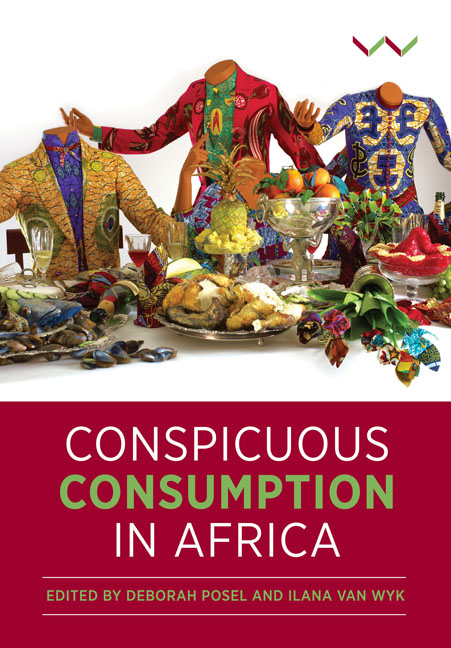Book contents
- Frontmatter
- Contents
- Acknowledgements
- List of Illustrations
- 1 Thinking With Veblen: Case Studies From Africa's Past and Present
- 2 Changes in the Order of Things: Department Stores and the Making of Modern Cape Town
- 3 Conspicuously Public: Gendered Histories of Sartorial and Social Success in Urban Togo
- 4 Etienne Rousseau, Broedertwis and the Politics of Consumption Within Afrikanerdom
- 5 Recycling Consumption: Political Power and Elite Wealth in Angola
- 6 Chiluba's Trunks: Consumption, Excess and the Body Politic in Zambia
- 7 Jacob Zuma's Shamelessness: Conspicuous Consumption, Politics and Religion
- 8 Precarious ‘Bigness’: a ‘Big Man’, His Women and His Funeral in Cameroon
- 9 Young Men of Leisure? Youth, Conspicuous Consumption and the Performativity of Dress in Niger
- 10 Booty on Fire: Looking at Izikhothane With Thorstein Veblen
- 11 Conspicuous Queer Consumption: Emulation and Honour in the Pink Map
- 12 The Politics and Moral Economy of Middle-Class Consumption in South Africa
- 13 Marigold Beads: Who Needs Diamonds?!
- Contributors
- Index
8 - Precarious ‘Bigness’: a ‘Big Man’, His Women and His Funeral in Cameroon
Published online by Cambridge University Press: 29 October 2019
- Frontmatter
- Contents
- Acknowledgements
- List of Illustrations
- 1 Thinking With Veblen: Case Studies From Africa's Past and Present
- 2 Changes in the Order of Things: Department Stores and the Making of Modern Cape Town
- 3 Conspicuously Public: Gendered Histories of Sartorial and Social Success in Urban Togo
- 4 Etienne Rousseau, Broedertwis and the Politics of Consumption Within Afrikanerdom
- 5 Recycling Consumption: Political Power and Elite Wealth in Angola
- 6 Chiluba's Trunks: Consumption, Excess and the Body Politic in Zambia
- 7 Jacob Zuma's Shamelessness: Conspicuous Consumption, Politics and Religion
- 8 Precarious ‘Bigness’: a ‘Big Man’, His Women and His Funeral in Cameroon
- 9 Young Men of Leisure? Youth, Conspicuous Consumption and the Performativity of Dress in Niger
- 10 Booty on Fire: Looking at Izikhothane With Thorstein Veblen
- 11 Conspicuous Queer Consumption: Emulation and Honour in the Pink Map
- 12 The Politics and Moral Economy of Middle-Class Consumption in South Africa
- 13 Marigold Beads: Who Needs Diamonds?!
- Contributors
- Index
Summary
On Christmas Day 2010, I phoned one of my uncles in the town of Limbe to wish him and his family a Merry Christmas. He lamented, ‘We have a Black Christmas here in Limbe. Our Christmas has been spoilt this afternoon. We have a really “big die” to worry over since about an hour ago.’
‘Who has died this time?’ I asked in mocking exasperation, recalling our multiple conversations over the great amount of time, energy and financial commitments that Cameroonians devote to funerals.
Ignoring my invitation to banter, my uncle replied, ‘Patrick Ebot, a prominent son of our village, died this afternoon in Yaoundé. I'm not sure you had met him, but we're like family.’
Born in 1945, Patrick was a relatively successful mid-level elite from the Manyu Division of South-West Cameroon. Typical of many successful people in Cameroon, he was an active member of various ethnic or hometown associations that made him a notable man both in the city and among local communities back home. By the time of his demise, he was vice-president of the Manyu Elite Development Organisation, a hometown association of elites whose specific mission was to raise funds and undertake small-scale development schemes to improve the lives of kinsmen in Manyu. This role gave him significant name-recognition and visibility among many people of Manyu origin in Yaoundé and other parts of the country who held significant positions of political power in government, including ministers and members of parliament.
For much of his professional life, Patrick lived in an increasingly affluent middle-class neighbourhood of the city. His house was made up of two separate adjoining housing units in an estate purchased, refurbished and redesigned to his taste. Patrick held a PhD in Education and a host of other diplomas obtained from Nigeria and the United Kingdom. These, and his professional work experience in Nigeria, helped him to obtain employment fairly easily as a programme manager at the embassy of a major Western country's development assistance and volunteering programme. After 19 years of service, he retired in 2007 as deputy director. His comfortable financial position and security of employment allowed Patrick to try his hand at different businesses over the years, especially after his retirement.
- Type
- Chapter
- Information
- Conspicuous Consumption in Africa , pp. 133 - 149Publisher: Wits University PressPrint publication year: 2019



